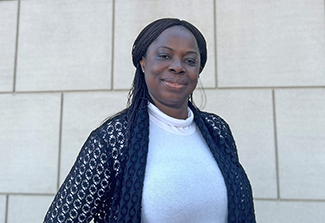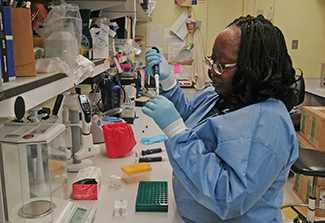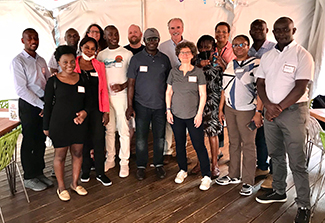Fellows from APTI's second cohort focus on neglected tropical diseases
November/December 2023 | Volume 22 Number 6
By Mariah Felipe
The
African Postdoctoral Training Initiative (APTI), established in 2019, prepares future generations of African researchers through four-year fellowships—two years spent in an NIH lab and an additional two years at their home institutions in Africa. A partnership between the African Academy of Sciences, NIH, and the Bill and Melinda Gates Foundation, the program supports 10 fellows each year. Past and current fellows have come from 14 countries and have been hosted by nine NIH Institutes and Centers. Fogarty caught up with two fellows from APTI’s second cohort, now in their second year, to learn how the program has impacted their careers and research, and to find out their goals for the future.
 Fogarty International CenterDr. Chinwe Chukwudi is currently studying protozoan parasites at the National Institute of Allergy and Infectious Diseases.
Fogarty International CenterDr. Chinwe Chukwudi is currently studying protozoan parasites at the National Institute of Allergy and Infectious Diseases.
Dr. Chinwe Chukwudi
“This program is exactly what Africa needs to overcome public health challenges, build capacity, and strengthen partnerships.”—Dr. Chinwe Chukwudi
Originally from the southeastern region of Nigeria, Dr. Chinwe Chukwudi began her research journey at the Royal Veterinary College, University of London, where she obtained her PhD in molecular biology and microbial genetics and completed postdoctoral studies under the sponsorship of the Commonwealth Scholarship Commission in the UK.
Now, with support from the University of Nigeria Nsukka, Chukwudi is working on two research projects at NIH as part of her APTI fellowship. Both focus on neglected tropical diseases. The first aims to develop a broad-spectrum topical treatment for cutaneous leishmaniasis by repurposing two existing antimicrobial agents. Leishmaniasis is a parasitic disease found in parts of the tropics, subtropics, and southern Europe. It is caused by infection with
Leishmania parasites, which are spread by the bite of phlebotomine sand flies.
Chukwudi’s lab studies show that the two antimicrobial compounds have been proven effective against at least eight different species of leishmaniasis, unlike the toxic medications currently in use that only work against specific species. She hopes to start clinical trials to test the efficacy of these compounds in cutaneous leishmaniasis patients upon her return home to Nigeria.
In her second APTI project, she is investigating the population genomics of African trypanosomes, parasites that infest the blood of various vertebrates, circulating in humans and animals in Nigeria. This project has uncovered new, previously overlooked areas where infections are occurring in Nigeria. These places could become hotspots for new types of parasites that have the potential to cause diseases or epidemics.
Through the APTI fellowship she has, “learned that a successful science or research career requires more than laboratory or research skills. Soft skills such as grantsmanship, research management, and knowing how to present and publish your research are equally, if not more, important.” With these skills and the laboratory training she has received during her fellowship, Chukwudi feels better prepared for success.
Chukwudi is extremely grateful to the APTI program staff and all of those involved in the training at NIH. Her career goal moving forward is to help train the next generation of African scientists and build a team of researchers in molecular biology and genetics that will develop effective interventions for the infectious diseases endemic to Nigeria and Africa.
 Photo courtesy Ajakaye Oluwaremilekun GraceDr. Ajakaye Oluwaremilekun Grace is currently studying protozoan parasites at the National Institute of Allergy and Infectious Diseases.
Photo courtesy Ajakaye Oluwaremilekun GraceDr. Ajakaye Oluwaremilekun Grace is currently studying protozoan parasites at the National Institute of Allergy and Infectious Diseases.
Dr. Ajakaye Oluwaremilekun Grace
"I believe that training African scientists to lead research and break new ground will have a ripple effect across Africa in the coming years."—Ajakaye Oluwaremilekun Grace
Dr. Ajakaye Oluwaremilekun Grace, another member of the second APTI cohort originally from Nigeria, has focused her research on neglected parasites, particularly those prevalent in Africa. Her research aims to uncover the genetic diversity of these parasites, as variations within parasite populations can influence virulence, transmission, and drug resistance. Genotyping these neglected parasites is the key to understanding their complex biology. The challenge, however, lies in resource-constrained environments where conventional genotyping methods are often impractical.
Because of this, Grace’s primary goal for her APTI fellowship has been to develop cost-effective and adaptable genotyping technologies specifically designed for these settings, which she has already accomplished. With a year still left in her fellowship, she’s created a low-cost, versatile, technique for genotyping these parasites based on next-generation multi-locus sequence typing or MLST. MLST is an important technique in molecular biology that involves amplifying and sequencing multiple parts of the parasite's genetic material at the same time. With this method, she has successfully characterized parasite samples (i.e., compared different types of parasites to determine how they are related and how they have evolved) from Nigeria and the Democratic Republic of the Congo. As a result, she discovered a hybrid schistosome species in both countries, thus shedding light on the intricate interactions and genetic diversity within these parasites.
 Photo courtesy Peter KilmarxDr. Peter Kilmarx poses with members of the second APTI cohort in 2022.
Photo courtesy Peter KilmarxDr. Peter Kilmarx poses with members of the second APTI cohort in 2022.
Her research uncovered recombination in giardia (another type of parasite) samples from asymptomatic children in Nigeria, providing critical insights into the genetic diversity and population structure of various parasite species.
The APTI program allowed Grace to expand upon her expertise in molecular parasitology and epidemiology while providing her with access to cutting-edge facilities at NIH and further nurturing her soft skills in science communication, leadership, mentorship, and team building. She has also expanded her professional network thanks to opportunities to attend international scientific events, present her research, and meet and network with specialists from various countries. These new strengths have put her in a position to consider starting her own molecular parasitology lab that can carry out high-quality research and train future scientists.
Grace says that her APTI fellowship has been “the springboard for her career” and believes its impact will extend well beyond these short four years. She hopes ultimately that this experience will allow her to influence the trajectory of parasitology research in Nigeria, the continent of Africa, and the world.
More Information
Updated December 5, 2023
To view Adobe PDF files,
download current, free accessible plug-ins from Adobe's website.
Related World Regions / Countries